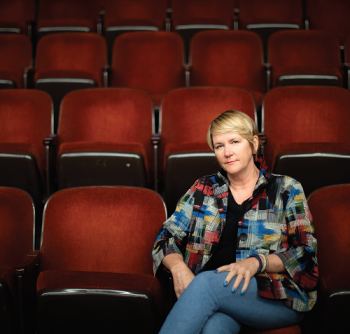Performing Arts Entities Explore Current Issues Through Their Productions
BY ANNA LYNCH
Omaha is a hotbed of inspiration, culture and arts. Interested in glassblowing? Take a class at the Hot Shops Art Center. Want to get a serious side-stich while watching local improv? Head to The Backline. Maybe you and your partner have an urge to salsa. Dance your way on over to the Nebraska Salsa Scene Dance Studio to learn. No doubt, arts and entertainment help shape our community, but how can the arts help shift the narrative on important conversations that are currently impacting society?
The Rose Theater, Omaha Community Playhouse and BLUEBARN Theatre all have a different approach when it comes shifting the narrative, whether that narrative has to do with racism, sexism, immigration or women’s rights. “The broader theater industry is at the forefront of talking about gender and racial equality,” says Matt Gutschick, artistic director at The Rose Theater. “I think that, unfortunately, we are not always at the forefront of creating actual systemic change on those fronts, but we always have the ability to influence this with our programming choices – whom we commission, what kinds of stories we tell, whom we hire to direct and design and whom we cast.”
And sometimes shifting the narrative, intentionally or unintentionally, can be as simple as casting. Gutschick mentions that a couple of seasons ago The Rose Theater did a production of Disney’s The Little Mermaid, in which they cast an actor of color to play Ariel. The Rose Theater was the first professional theater in America to do this with a Disney show. “It felt organic to who we are,” he says. “The real hero is the young woman who played Ariel. She is the change agent in the tale, just by being brave enough to lay claim to the role that was hers by any possible measure of ability.”
Gutschick mentions there was some negative feedback from audiences, but that feedback “paled in comparison to the number of beautiful notes about how powerful this experience was for families of all types.” Other conversations in the media this year have centered around DACA and new immigration plans and policies. While these conversations aren’t always directly addressed on stage, particular productions intentionally and artistically weave in current issues like these.
“All of our shows are more than simply entertainment,” Gutschick says. “For example, we are producing Winnie The Pooh on our stage, but this particular version is about what happens when the Hundred Acre Wood community tries to close itself off to a new entrant—an immigrant.”
Conversations around sexism have also ramped up this year. “These topics [sexism and racism] have been issues since the beginning of theater and have always impacted our industry,” says Kimberly Hickman, artistic director at the Omaha Community Playhouse. “Artistic directors need to honor their organization’s past, but also hold themselves accountable to these important topics, so they can move their theater forward. We cannot fall behind.”
Some of these conversations are being addressed offstage in the theater community, too. Hickman says this was apparent when she attended the largest regional theater conference in the country — the TCG National Conference. “So many things are changing in the theater community and many questions are being asked,” Hickman says. “Like what are theaters doing to address accessibility, harassment and other cultural issues that are urgent topics of conversation?”
Sometimes addressing these issues and shifting perspectives and perceptions comes down to a theater’s season and diverse writers, so that “audiences are able to see art that reveals different perspectives,” Hickman adds. Susan Clement, producing artistic director at BLUEBARN Theatre, notes that she is careful to not select a show that is overtly hitting the audience over the head with a message, but enables the audience to shape their own perception of a production. “We’re not an agenda-based theater company,” Clement says. “As an artist, we do what we are called to do… I don’t ever want to think that my expression is controlling somebody else’s or is able to shape anybody else’s perception – that’s their job, that’s their life, that’s their life in themselves,” Clement adds.
And while Clement mentions personal beliefs can influence show selection, she reinforces that BLUEBARN is its own entity, and the importance of keeping that intact is priority above any personal beliefs. Their mission is to provoke thought, emotion, action and change. “It’s always had its own heartbeat, own unique voice, and it’s my job, as the artistic director, to make sure that that voice continues and evolves in a way that still respects our audience and the artists at work,” Clement says. Between these local theater companies, the messages and attempts to shift the narrative might lean more subliminal or more direct, but one thing’s for certain: these conversations are important and need to be addressed.

